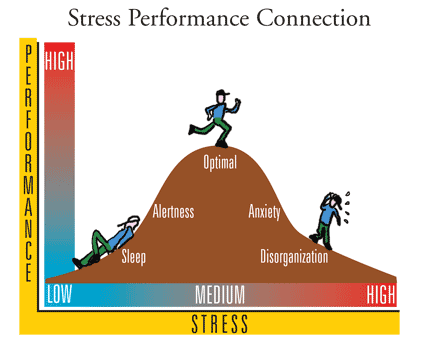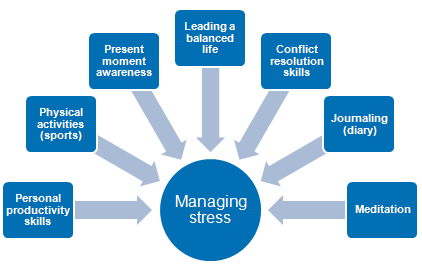YOUR INDIVIDUAL STRESS MANAGEMENT PROGRAM
- Learn to smile. Force it if you have to. Wear one when you walk. Your brain receives signals based on your physical appearance.
- Learn to be optimistic. Force it if you have to. When you’re in a difficult situation, learn to ask yourself, “What’s the best that could happen?” Let optimism become your goal, and plan with achieving it in mind. Even if you don’t achieve your best, embrace positivity. Focus on the opportunities, not the obstacles.
- Learn to have fun. Force yourself to have fun, whatever that is for you. Plan specific activities that will make you smile and laugh. Your brain and body need this outlet.
- Learn variety. Force yourself to switch your routine. Even if you’re a workaholic or in a stressful environment, maneuver between activities.
- Learn to break. Force yourself to rest, both mentally and physically. Turn it off and recharge. You’ll be more efficient when you return and won’t be as stressed about the activities you must perform.
- Learn to add by subtraction. At some point you’ve got to learn to move past those things in your life that produce physical and mental stress. This includes foods, habits and sometimes people. I recently came across this quote:
“Show me your friends, and I’ll show you your future.”
That should either be a ringing endorsement of your choices or a warning sign. Make good choices!
Remember, these activities address both physical and emotional stress.
“Sound mind = sound body” is a real thing!
Physical activity creates good blood flow and healthy muscles and other tissues. This will reduce your levels of stress.
- Don’t just sit there. Commit to do something. Commit to a routine.
- Strive for 150 minutes/week of aerobic activity.
- You’ll perform best with a personal trainer, but you don’t even need to join a gym. If you engage in brisk walking for 20 minutes/day, you’re good.
- If you don’t have a trainer, get a workout partner or group. This is using peer pressure in a positive way.
Nutrition is the fuel for your body’s normal functioning. It will keep your brain and body sharp, your immune system powerful and you less susceptible to physical and emotional stress.
- Use the food plate guide to facilitate making healthy choices.
- Increase the amounts and varieties of fruits and vegetables you eat.
- Stop eating when your body tells you that you’re full. Don’t worry so much about “finishing your plate.”
- Avoid super-sized anything unless you’re splitting the servings.
Social support—an effective support network—can serve to dissipate your stress. Stress without an outlet is a force multiplier.
- Wear a smile as your shield from stress. It invites positivity and positive people. Bringing new friends into your life is exciting for most people. Make an effort to socialize and enjoy the benefits of friendship, family and strong networks.
- You are your own best support. If you hardwire positivity into your personality, you will find yourself less stressed. Take care of yourself, and be good to yourself and those around you.
Relaxation is for many people a distant memory that should go high on your New Year’s resolution list.
- If you don’t have time to relax, make time. If you can’t make time, take time. Enjoy your family, hobbies and life!
- You must learn to connect mentally with your body’s cues. If you’re tired, rest. If you’re in pain, don’t push it. These early signs of physical stress are meant to be warnings. Take heed.
- Don’t laugh, but relaxation techniques work! Consider mediation, yoga or just
“resting your eyes.” Appreciate the healing power of music and the arts. The deeper you get into these effects, the better they become at relaxing you. - Sleep is your body’s way to reset and replenish. Good sleep habits are an important way to alleviate your stress.
Professional Support
We multiply our stressors by failing to take advantage of the resources that are available. If your efforts to put a stress management program in place are unsuccessful, and you’re still addressing more than you can handle, you have a wealth of talented caring professionals ready to provide assistance. Licensed social workers, psychologists and psychiatrists can teach you additional stress management techniques and strategies. Nutritionists and personal trainers can fine-tune those factors that may otherwise contribute to physical stress. Your communities likely have resources to help. Of course, you also have access to 844-SMA-TALK and www.sterlingmedicaladvice.com, both of which offer you trained mental health professionals to get you through whatever issues you’re confronting.
Feel free to ask your SMA expert consultant any questions you may have on this topic.
Thanks for liking and following Straight, No Chaser! This public service provides a sample of what 844-SMA-TALK and http://www.SterlingMedicalAdvice.com (SMA) offers. Please share our page with your friends on WordPress. We are also on Facebook at SterlingMedicalAdvice.com and Twitter at @asksterlingmd.
Copyright © 2015 · Sterling Initiatives, LLC · Powered by WordPress





